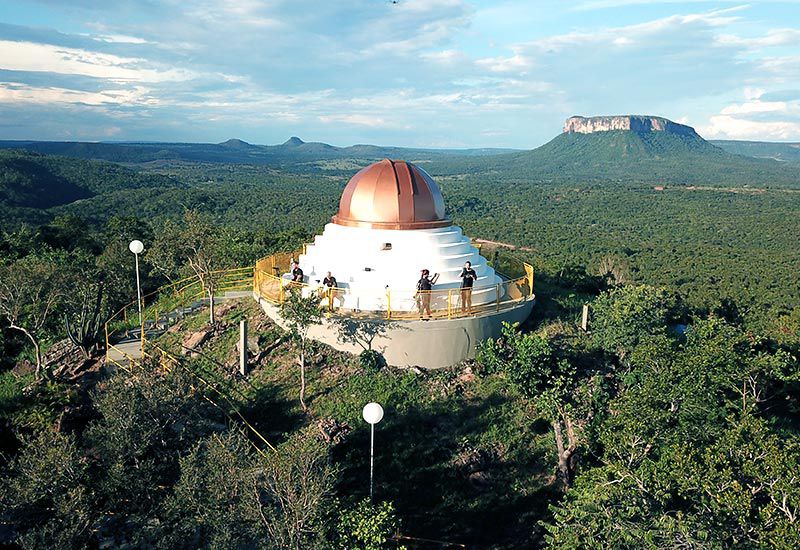Throughout history, inexplicable phenomena have exerted a hypnotic fascination, generating mixed feelings of attraction and fear. When these phenomena occur in the sky, particularly at night, the imagination is sparked with the possibility that they may be related to extraterrestrial life, leading to a rich chronology of debates and research.
The public perception of unidentified flying objects (UFOs) changed forever after 1947. On June 24, while piloting his plane, Kenneth Arnold observed nine bright objects moving rapidly across the sky over Mount Rainier in Washington. From then on, countless UFO reports emerged worldwide, from the Roswell incident (August 1947), in which an extraterrestrial spacecraft supposedly crashed near Roswell, New Mexico, to the Phoenix Lights (March 1997), which generated a global obsession.
The Brazilian Air Force (FAB) report on UFO sightings is published periodically, but it does not follow a fixed annual schedule. The FAB began documenting and officially releasing reports on unidentified aerial phenomena in 1954. The records were kept confidential for many years, but since the 2010s, some of these documents have been made available to the public through the National Archives, in accordance with the Access to Information Law.
Although the FAB does not have a regular schedule for releasing this material, new documents are typically released in batches, covering varying periods depending on the testimonies received and analyzed. Each new batch may bring to light information about sightings in different years, with the most recent documents often being the most eagerly awaited by researchers and the interested public.
The most recent report revealed that, just in 2023, pilots reported seeing 80 unidentified flying objects (UFOs) in Brazilian airspace. Whenever this compilation is released, it reignites the debate about the existence of extraterrestrial life and the possibility of contact with beings from other planets.
While the news often causes surprise and unease among the general population, researchers from the Dakila Pesquisas Association have been cataloging similar evidence for over 20 years. They have long demonstrated that the sightings are a concrete manifestation of phenomena that defy conventional explanations and indicate the need for traditional science to adopt a more comprehensive approach to investigating the subject.
The sightings reported by pilots involve objects of various shapes and behaviors, from lights moving at high speeds to metallic structures that challenge known laws of physics. In some cases, pilots described objects that followed their aircraft for long periods, performing maneuvers impossible for any known human technology.
The reports were recorded by commercial and military pilots, many of whom have decades of experience in the air. The FAB, which maintains a rigorous protocol for investigating such occurrences, has compiled and analyzed the reports in search of patterns. The report, although technical, admits that the descriptions provided by the pilots do not match any known aircraft or meteorological phenomenon.
Dakila Pesquisas, which has cutting-edge laboratories in Brazil and abroad, recognizes that the sightings are just the tip of the iceberg. According to the association, the actual number of sightings is much higher, but many cases are not reported due to fear of discredit or the stigma associated with the subject.
The FAB report data reinforces the importance of independent research, and what is at stake here is more than mere curiosity. We are facing phenomena that could alter our understanding of the universe and humanity’s place in it.
Urandir Fernandes de Oliveira, researcher, scientist, historian and president of the Dakila Pesquisas Institute, talks about the subject: “In the United States, the issue of UFOs gained prominence after the government released reports confirming the existence of unexplained aerial phenomena, drawing the attention of politicians and military personnel. In Brazil, however, the topic is still treated with some reservation, although the increasing number of sightings makes a more open and transparent debate inevitable”.
Urandir and the Dakila researchers argue that a partnership between government institutions and independent research centers is necessary to investigate these phenomena with the seriousness they deserve. “We are not talking about mere conspiracy theories. There is data and concrete evidence that needs to be studied,” Urandir stresses.
With the growing public interest and pressure for answers, Brazil may be on the brink of a new era in UFO investigation. The Dakila Pesquisas Association plans to expand its efforts by investing in cutting-edge technologies and collaborating with scientists from various disciplines to better understand the phenomena that challenge traditional logic.
For many, the FAB report is a sign that there is much more to be discovered. “We are only scratching the surface,” concludes Oliveira. “What is out there, in the sky, is an invitation to expand our boundaries of knowledge.”
Whether UFO sightings represent the beginning of a new phase in human history remains to be seen. What is certain, however, is that the search for answers is far from over.
Source: Instituto Dakila Pesquisas


